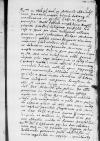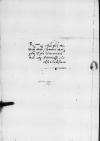Dictu difficile, Amplissime Praesul, quanta fuerim voluptate perfusus litteris Celsitudinis Vestrae Reverendissimae per fratrem Valentin Hannau (Valentinus Hannovius), Dantiscus' nephew, son of Anna von Höfen and Johann Hannau, brother of Johann, Kaspar and Simon Hannau⌊ValentinumValentin Hannau (Valentinus Hannovius), Dantiscus' nephew, son of Anna von Höfen and Johann Hannau, brother of Johann, Kaspar and Simon Hannau⌋ redditis, partim quod Cathecismos Filippo Archinto (*1495 – †1558), theologian and diplomat, protector of Ignatius Loyola; 1536 Vicar General of Rome; 1539 Bishop of the Holy Sepulchre; 1546 Bishop of Saluzzo; 1556 Archbishop of Milan, 1553 papal legate in Venice⌊Philippi ArchintiFilippo Archinto (*1495 – †1558), theologian and diplomat, protector of Ignatius Loyola; 1536 Vicar General of Rome; 1539 Bishop of the Holy Sepulchre; 1546 Bishop of Saluzzo; 1556 Archbishop of Milan, 1553 papal legate in Venice⌋ acceperim, quibus amicos demerui, tum vero maxime, quod eundem fratrem thermas adire volentem recuperandae sanitatis gratia amplo viatico Celsitudo Vestra Reverendissima providere dignata sit. Hic, cum nihil novi eadem fecerit, utpote quae erga propinquos et consanguineos (exteros tacebo) miro affectu humanitateque incredibi<li> ducitur nulli non opem suppetiasque ferens, meminisse subinde iuvat, quanta ex Celsitudinis Vestrae Reverendissimae innata clementia et liberalitate indignus acceperim beneficia, ut etiam si capitis huius auctionem fecero, vel sorti solvendae par superinscribed⌈parpar superinscribed⌉ esse possim. Sic eodem proximo in Valentin Hannau (Valentinus Hannovius), Dantiscus' nephew, son of Anna von Höfen and Johann Hannau, brother of Johann, Kaspar and Simon Hannau⌊ValentinumValentin Hannau (Valentinus Hannovius), Dantiscus' nephew, son of Anna von Höfen and Johann Hannau, brother of Johann, Kaspar and Simon Hannau⌋ collato officio aequ{a}e me Celsitudo Vestra Reverendissima obnoxium reddidit. Verum, quae recompensatio a nobis fieri possit, non reperio, cum ut Deum Optimum Maximum indignis nostris precibus flagitemus, quo stamina vitae Celsitudinis Vestrae Reverendissimae faciat quam maxime longaeva et tandem in beatiori vita pietatis obsequia multo cum foenore persolvat. Venerabilis dominus Eustathius Knobelsdorf (Constans Alliopagus) (*1519 – †1571), neo-Latin poet, studied at the universities in Frankfurt an der Oder (1534-1544), Wittenberg (1538), Leipzig, Louvain (1540), Paris, and Orleans; from 1533 Dantiscus provided financial support for his education; 1544 secretary of the Ermland (Warmia) Chapter; 1546 Canon of Ermland; 1546 Canon of Wrocław (Breslau); 1546-1548 Chancellor of the Ermland Chapter; 1548-1551 administrator of the Chapter's estate in Allenstein (Olsztyn); 1552 Custos of Ermland; 1553 Vicar General of the bishopric of Ermland; 1558-1564 administrator of the diocese of Ermland in the absence of Bishop Stanisław Hozjusz; 1559 Chancellor of the Wrocław Chapter; 1565 Dean of the Wrocław Chapter; 1567 General Judicial Vicar of the diocese of Wrocław (BORAWSKA 1996 Życie, p. 70, 103; KOPICZKO 2, p. 152; SBKW, p. 152; KNOBELSDORF)⌊EusthatiusEustathius Knobelsdorf (Constans Alliopagus) (*1519 – †1571), neo-Latin poet, studied at the universities in Frankfurt an der Oder (1534-1544), Wittenberg (1538), Leipzig, Louvain (1540), Paris, and Orleans; from 1533 Dantiscus provided financial support for his education; 1544 secretary of the Ermland (Warmia) Chapter; 1546 Canon of Ermland; 1546 Canon of Wrocław (Breslau); 1546-1548 Chancellor of the Ermland Chapter; 1548-1551 administrator of the Chapter's estate in Allenstein (Olsztyn); 1552 Custos of Ermland; 1553 Vicar General of the bishopric of Ermland; 1558-1564 administrator of the diocese of Ermland in the absence of Bishop Stanisław Hozjusz; 1559 Chancellor of the Wrocław Chapter; 1565 Dean of the Wrocław Chapter; 1567 General Judicial Vicar of the diocese of Wrocław (BORAWSKA 1996 Życie, p. 70, 103; KOPICZKO 2, p. 152; SBKW, p. 152; KNOBELSDORF)⌋ per hos dies celebres totus erat in suo epicedio me urgente et hac hebdomada potiorem partem absolvisset, ni hodie cogeretur in negotiis capitularibus
 BCz, 1599, p. 1092
Mehlsack (Melzak), town in Ermland (Warmia), 32 km SE of Frauenburg (Frombork), today Pieniężno⌊MelsacMehlsack (Melzak), town in Ermland (Warmia), 32 km SE of Frauenburg (Frombork), today Pieniężno⌋ proficisci, biduum aut triduum ibi commoraturus. Inde reversus, quod reliquum fuerit, quanto poterit temporius perficiet, tandem una Celsitudinem Vestram Reverendissimam invisemus. Eandem quam hidden by binding⌈[m]m hidden by binding⌉ diutissime Christus Ihesus florentem tueatur incolumem.
BCz, 1599, p. 1092
Mehlsack (Melzak), town in Ermland (Warmia), 32 km SE of Frauenburg (Frombork), today Pieniężno⌊MelsacMehlsack (Melzak), town in Ermland (Warmia), 32 km SE of Frauenburg (Frombork), today Pieniężno⌋ proficisci, biduum aut triduum ibi commoraturus. Inde reversus, quod reliquum fuerit, quanto poterit temporius perficiet, tandem una Celsitudinem Vestram Reverendissimam invisemus. Eandem quam hidden by binding⌈[m]m hidden by binding⌉ diutissime Christus Ihesus florentem tueatur incolumem.
 BCz, 1599, p. 1092
BCz, 1599, p. 1092


